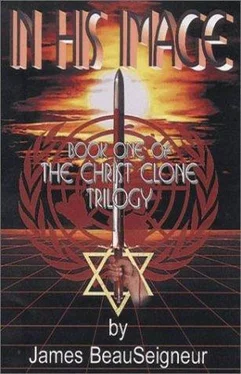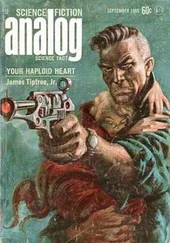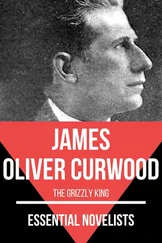Decker realized the comparative triviality of his plea and stepped into the background.
"I have the Syrian Ambassador's office on the phone, Mr. Ambassador," Hansen's daughter said, this time remembering to use the proper title. "He'll pick up as soon as you're on the phone."
Hansen was still writing and listening, while looking up at his daughter. "Frank, I've got Ambassador Murabi on the other phone. I'll talk to him first and then make the other calls. If I don't call you back within fifteen minutes, then you call me."
Hansen was just about to hang up when he remembered something and put the phone back to his ear. "Frank," he said loudly into the mouthpiece, hoping to catch Ambassador Rogers before he hung up. There was a brief anxious silence and then he continued. "Frank, one other thing. It's a personal favor. You recall those two Yanks I brought back from Lebanon? Well, one of them is here with me in the office and he says that the other is still in the hospital there in Tel Aviv." Hansen listened. Decker listened. "Yes, that's right." Ambassador Hansen looked at Decker, his inquisitive glance requesting details.
"The Tel-Hashomer Hospital in Tel Aviv," Decker responded.
"Tel Hashomer," Hansen repeated. "His name is Tom Donafin. How much longer is he supposed to be there?" he asked, looking over at Decker.
"He's supposed to get out any day. They were just keeping him for observation after his final surgery last week," Decker answered.
"Frank," Hansen said back into the phone, "apparently he can leave anytime. If you could have someone check up on him, and if he's fit to travel, get him on a plane out of there."
Hansen hung up the phone and acknowledged Decker's look of appreciation. "Rogers is a good man. He'll do what he can." Decker didn't have a chance to reply before Hansen continued. "Right now though," he said as he poised his finger above the blinking light on the phone, "I'm afraid I have to ask you to leave." Decker began to move toward the door. "Leave your number with Jackie and we'll call you if we hear anything about Tom."
Robert Milner, former Assistant Secretary-General of the United Nations, came through the door of the Lucius Trust with the energy of a man half his age. "I must speak to Alice," he hurriedly told the receptionist. "Where is she?" He didn't wait for an answer, but moved quickly around the young woman's desk toward Alice Bernley's office.
"I'm sorry, Mr. Secretary, Ms. Bernley isn't in," the receptionist said, but Milner's momentum carried him the rest of the way to Bernley's office door.
"Where is she? I must speak with her immediately!" he said, as he moved crisply through a 180 degree turn back towards the receptionist.
"She didn't say. But I expect her back any minute."
Milner's energy seemed to lose direction as he began aimlessly, anxiously to pace the floor of the Trust's front office. The receptionist offered Milner a cup of herbal tea, which he accepted but didn't drink.
Twenty minutes passed before Milner saw the red-haired Alice Bernley returning to her office from across the U.N. Plaza. She was walking quickly, excitedly, but not fast enough to satisfy Milner, who ran to meet her. As she saw him coming toward her, she quickened her pace. Almost in unison they called out the other's first name: "Alice!" he said.
"Bob!" she called.
Then in unison: "I've seen him!"
"Where? When?" she asked, hurriedly. She had been running and was trying to catch her breath.
"In the U.N., not more than half an hour ago! He passed within inches of me. I could have reached out and touched him! But, quickly, where did you see him?"
"Only moments ago, on Second Street, in front of One Dag Hammarskjold. He was with a man, getting into a cab. I tried to… " Alice Bernley dropped the rest of her sentence as she watched the smile on Milner's face grow broad with the excitement of a promise fulfilled. Only then did she come to fully appreciate the significance of this moment. For a moment they just looked at each other.
"We've seen him," she said, finally.
"We have seen him," he confirmed. "Just as Master Djwlij Kajm promised!"
Why Hast Thou Forsaken Me?
Tel Aviv, Israel
Tom Donafin sat on the edge of his bed in Tel Aviv's Tel-Hashomer Hospital adjusting the strap on the new camera that Hank Asher had sent him as a get-well present. Outside Tom's window, a performance of major proportion in the night sky was made surreal by the glow of fires from the ground. The sparkle of anti-aircraft artillery painted narrow stripes across the sky as now and then the bright flash of an explosion added terrifying color to the canvas. Tom had captured it all, beginning only moments after the first shots were fired. He had even photographed a dogfight between a squadron of Libyan MIG-25s and Israeli F-15 Eagles.
Tom walked back to the open window and scanned the horizon for action. Like most of the other lights in the city, the lights of the hospital had been extinguished to avoid drawing the attention of enemy pilots – a condition which, coincidentally, also allowed for better night photography. Behind him Tom heard a knock on his hospital room door and turned quickly, a little startled.
As Tom turned in the darkened room, the person at the open door suddenly found himself facing a barrel pointed directly at him. Instinctively he ducked, but even as he did, he realized that the sinister barrel that seemed at first to be some type of small bazooka or shoulder-held anti-tank weapon was, in fact, only the telephoto lens of the American's camera.
"I'm terribly sorry!" Tom said, lowering the camera as he hurried to offer his hand to help his unexpected visitor up from the floor. "Are you all right?"
"I'm fine," the man muttered in a British accent through his embarrassment, while brushing himself off. "Are you Donafin?"
"Yeah, I'm Tom Donafin," Tom responded, offering his hand again, this time in greeting. "Who are you?"
"I'm Polucki from the British Embassy," he said formally. "On behalf of Ambassadors Rogers and Hansen I'm here to offer you the assistance of His Majesty's Government in expediting your evacuation from the State of Israel. Please accept my apologies for not notifying you earlier. We attempted to alert you to the situation but the telephone lines are down. At the direction of Ambassador Rogers, I've taken the liberty of inquiring of your doctor regarding your fitness for travel. He entirely agrees that, under the present circumstances, your full recovery would be facilitated by your immediate departure from the area of present hostilities. Besides," he added less formally, "they'll be needing the bed for the wounded."
"Where exactly do you plan to take me?" Tom asked.
"My instructions are to drive you to the British Embassy where you will be provided for until suitable arrangements can be made for your departure on the next U.K., U.S. or U.N. flight or vessel. If you prefer, I am to deliver you to the U.S. Embassy, where similar arrangements will be made."
Tom had been anxious to get out of the hospital, so he eagerly accepted Ambassador Roger's offer. In ten minutes they were on their way out the front door. There were no lights in Tel Aviv that night except the fires of burning buildings, which reflected against the smoke-filled sky and shrouded the city with an eerie glow.
"Polucki," Tom said, as his young British escort slowly drove the Mercedes through the abandoned streets, turning his lights on only when absolutely necessary and only for a few seconds at a time. "What's your first name?"
"Nigel, sir," Polucki replied.
"Polucki is a Polish name, isn't it?" Tom asked. "Yes, sir. My grandparents escaped to Britain at the beginning of the Second World War. They were part of the Polish government-in-exile which the British officially recognized as the true government of Poland."
Читать дальше












